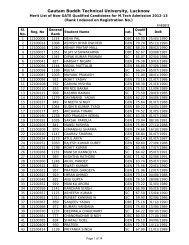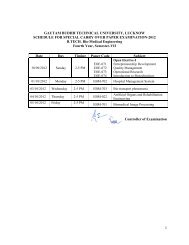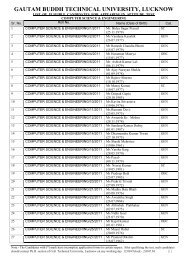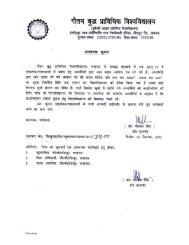NOTE MASTER OF BUSINESS ADMINISTRATION (MBA): The ...
NOTE MASTER OF BUSINESS ADMINISTRATION (MBA): The ...
NOTE MASTER OF BUSINESS ADMINISTRATION (MBA): The ...
Create successful ePaper yourself
Turn your PDF publications into a flip-book with our unique Google optimized e-Paper software.
Financing Decision: Long-term sources of finance, potentiality of equity shares, preference shares, debentures and bonds as<br />
source of long-term finance; Concept and approaches of capital structure decision; NI, NOI, Traditional and Modigliani Miller<br />
Approach; Cost of equity share, preference share and debentures<br />
Unit V (6 Sessions)<br />
Dividend Decision: Concept of retained earning and plough back of profits, relevancy and irrelevancy theory of dividend<br />
decision; Walter’s model; Gordon’s Model and Modigliani Miller model; Factor affecting dividend decision<br />
SUGGESTED READINGS:<br />
1) Pandey I M- Financial Management (Vikas, 2004)<br />
2) Van Horne- Financial Management and Policy (Pearson Education, 12 th edition) 2003,<br />
3) Knott G-Financial Management (Palgrave, 2004)<br />
4) Khan and Jain- Financial Management (Tata McGraw-Hill, 3 rd edition)<br />
5) Prasanna Chandra- Fundamentals of Financial Management (TMH), 2004.<br />
6) Kirt C Butler- Multi National Finance (Vikas)<br />
7) R P Rustagi- Financial Management (Galgotia) 2000, 2 nd reved.<br />
8) Lawrence J. Gitman- Principles of Managerial Finance 2004, Pearson Education N. Delhi.<br />
<strong>MBA</strong> 215: RESEARCH METHODOLOGY Max. Hours: 40<br />
Unit I (8 Sessions)<br />
Introduction: Concept of research and its applications in the various functions of management; Types of research. Types of<br />
business problems encountered by the research; Problems and precautions to the researcher in India<br />
Unit II (8 Sessions)<br />
Process of research: Steps involved in research process; various methods of research design<br />
Unit III (8 Sessions)<br />
Data collection: Sampling procedure; Sample size; Determination and selection of sample member; Types of data and various<br />
methods of collecting data; Preparation of questionnaire and schedule; Precautions in preparation of questionnaire and<br />
collection of data<br />
Unit IV (10 Sessions)<br />
Analysis of data: Coding, editing and tabulation of data; various kinds of charts and diagrams used in data analysis; Application<br />
of statistical techniques for analysing the data, Application of Analysis of Variance (ANOVA), Uses of Data Analysis Tools<br />
like SPSS and Excel.<br />
Unit V (6 Sessions)<br />
Report Preparation: Types and layout of research report; Precautions in preparing the research report; Bibliography and<br />
Annexure in report; Drawing conclusions; Giving suggestions and recommendations to the concerned persons<br />
SUGGESTED READINGS:<br />
1) Collis J and Hussey R- Business Research (Palgrave, 2003)<br />
2) Cooper- Business Research (Tata McGraw-Hill)<br />
3) Saunders- Research Methods for Business Students (Pearson Education, 3 rd edition)<br />
4) Beri- Marketing Research (Tata McGraw-Hill), 1993, 2 nd ed.<br />
5) David J. Luck and Ronald S. Ruben- Marketing Research (Prentice Hall of India), 1987, 7 th ed.<br />
<strong>MBA</strong> 216: ECONOMIC ENVIRONMENT <strong>OF</strong> <strong>BUSINESS</strong> Max. Hours: 40<br />
Unit I (6 Sessions)<br />
Concept of business environment: Significance and nature, the interaction matrix of different environment<br />
factors, the process of environmental scanning, basic philosophies of capitalism and socialism with their<br />
variants<br />
Unit II (10 Sessions)<br />
Politico-legal environment: Relationship between business and Government of India; Constitutional<br />
provisions affecting business; Introduction to some important business laws: MRTP, Industrial<br />
(development and regulation) Act 1951, FEMA, SEBI Act, Consumer Protection Act; Changing<br />
dimensions of these laws and their impact on business<br />
Unit III (8 Sessions)<br />
Economic environment: Philosophy and strategy of planning in India; Problem of poverty; Concept of<br />
mixed economy: the public sector and the private sector, their changing roles; Industrial policy in India in<br />
recent years; Policy with regard to small scale industries and labour; <strong>The</strong> monetary policy, fiscal policy<br />
and union budget as an instrument of growth and their impact on business. Financial institutions and their<br />
relevance to business operations; Multinational corporations (MNC)<br />
8


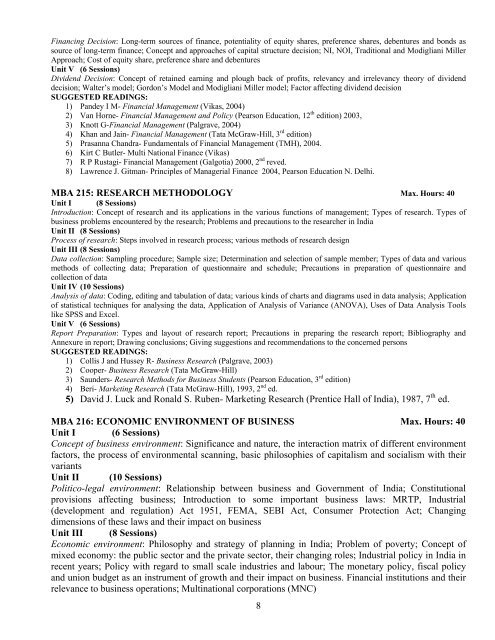
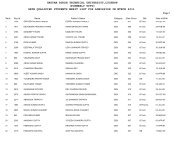
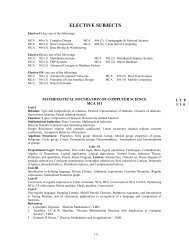
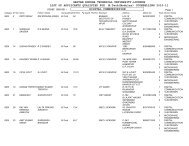
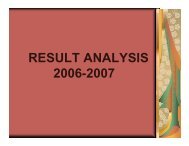
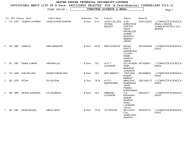
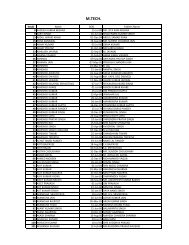
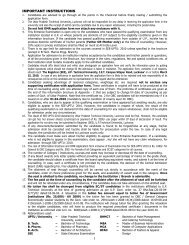
![[MODEL QUESTION PAPER] B-Tech FIRST SEMESTER ...](https://img.yumpu.com/47613205/1/190x245/model-question-paper-b-tech-first-semester-.jpg?quality=85)

